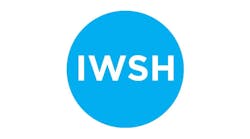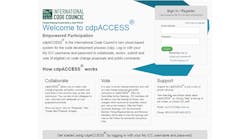Latest from Codes
Sponsored
cdpACCESS is the International Code Council’s online tool for code development. It makes submitting code change proposals fast and easy. Anyone with an interest in improving the model codes is welcome to send their suggestions to this robust, cloud-based tracking collaboration and voting system at www.cdpACCESS.com (or click “cdpACCESS” at the black banner on the ICC homepage, www.iccsafe.org).
cdpACCESS saves time and money while providing a single portal for code officials and other interested persons to stay on top of proposed code changes, offer their commentary and determine the outcome by their votes. The concept of online participation in ICC’s Code Development Process dates back to 2001 when off-site voting on code changes was used by the three model code organizations that later consolidated to become ICC.
cdpACCESS is intended to make the entire code development process open and transparent to all participants as well as any person or entity that may be affected by the codes. The portal includes features that allow users to share information and opinions, as well as watch videos of comments made at the various the code development hearings. cdpACCESS allows anyone to participate in code development from a computer or tablet.
Among the features offered on the cdpACCESS portal are:
- The ability for online collaboration with one or many colleagues;
- The capacity to view, download and print the Code Change Agenda;
- The opportunity for online users to submit floor modifications at the Committee Action Hearings*;
- The capability to vote online for assembly floor motions following the Committee Action Hearing. All ICC Members are eligible to vote online on assembly floor motions;
- The capacity to view, download and print the Report of the Committee Action Hearing;
- The ability to create and submit online public comments to the Committee Action Hearing results;
- The capability to view, download and print the Public Comment Agenda; and
- The ability for ICC Governmental Member Voting Representatives and Honorary Members to vote online on proposed code changes/public comments following the Public Comment Hearing.
Support for cdpACCESS includes help by phone and email to answer questions, receive comments and suggestions, and report any system errors. The toll-free cdpACCESS hotline is 855-ICC-CDP-1 (422-2371); email can be sent to [email protected]. Detailed cdpACCESS instructions and a schedule of upcoming webinars can be viewed at www.iccsafe.org/cdpaccess/.
About ICC
The ICC is a U.S.-based, not for profit, 58,000-member association of professionals and volunteers who are responsible for the development, publication and enforcement of model consensus codes for building and fire safety, including the International Building Code (IBC) and International Fire Code (IFC). The IBC is in use or adopted in all 50 states, the IFC is in use or adopted in 42 states, while the International Residential Code (IRC) is in use or adopted in 49 states, the District of Columbia, Guam, Puerto Rico and the U.S. Virgin Islands. ICC offers free, read-only access to all its current codes at http://codes.iccsafe.org/I-Codes.html.
In addition to publishing these codes, ICC offers its members a variety of important services including code training and education, plan review and code interpretations, technical opinions, inspector certification and agency accreditation, product evaluation, and a range of products. As code enforcement professionals, ICC Members are encouraged to suggest code changes and vote on them for adoption as model legislation.
The development of codes and standards in the United States affects all Americans, as they live, work and go to school in buildings designed to comply with building codes, and use thousands of products that meet consensus standards (and in most cases meet many different standards) largely developed by a few hundred private sector, non-profit organizations. Americans sometimes focus on government requirements, but are not often aware of the many private sector standards that are either voluntarily adopted by architects, designers and manufacturers, or adopted as regulations by Federal, state and local governments.


